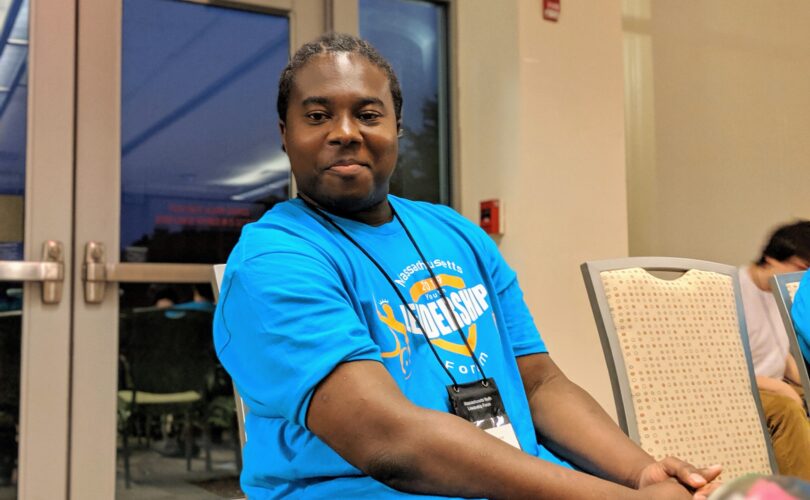For PYD and many other organizations, this year is full of firsts.
Monday, June 15th through June 29th was a special 11 days and a key point in our history – we facilitated the first virtual Youth Leadership Forum. We tried our best to make the event look and feel as similar to the annual in-person one as possible. Alongside our collaborators, the Massachusetts Rehabilitation Commission, the Massachusetts Department of Mental Health, the Massachusetts Developmental Disabilities Council, and Spaulding Rehabilitation Network, as well as numerous partners, we facilitated a memorable experience for our youth, which included delegates and peer leaders participating in workshops, networking, speeches, an open mic night, trivia, and so much more to empower them in becoming leaders.
Topics ranged from anti-racism, self-care, songwriting, telling your story, legislative advocacy, adaptive sports, job searching, networking, interviews, and the Disability Integration Act, to name a few.
Our legislative advocacy panel and discussion moved many of our youth. During this event, the audience heard from four individuals involved in policy and advocacy in the state of Massachusetts. Panelists included Steve Higgins, Executive Director of Independent Associates, Dan Harris, former YLF peer leader, disability rights activist, and youth transition advocate at the Boston Center for Independent Living, state representative Sean Garballey, Gyasi Burks-Abbott, writer, speaker, autism self-advocate, and Gopen Fellow at the Institute for Community Inclusion at UMass Boston. Throughout the presentation, youth were given the opportunity to interact and ask questions with our dedicated panelists, as well as voice their own ideas on how to improve the lives of people with disabilities.
The panel opened with a word from our Deputy Director, Dr. Susan Nicastro.
“This is one of my favorite days of YLF,” said Susan.
Steve Higgins began by introducing each of our panelists, including himself. He represented all six New England states in Washington on the National Council for Independent Living and served as a chair member of the ADA and civil rights committee for persons with disabilities on a national level. Steve became passionate about disability through his own experiences and a quote that changed his life:
“Get involved with politics as if your life depends on it because it does. And so does the lives of future generations.”
Next up to be introduced to our audience was Dan Harris. Dan was a former YLF participant and works at the Boston Center for Independent Living as a youth transition advocate. He’s most proud of his work advocating for accessible transportation, housing, and healthcare.
Aside from being a writer, speaker, and autism self-advocate, Gyasi Burks-Abbott shared his personal experiences with autism at numerous conferences nationally and abroad, served on the board of different autism focused organizations, became a lend fellow at Boston Children’s hospital where he advocated for the reauthorization of the Autism Cares Act, and created a website with resources for the autistic community.
Last but certainly not least, state representative Sean Garbally was introduced. He began his career in public service once elected by a local school community. He then obtained a bachelor’s degree in political science and ran for the Massachusetts House of Representatives at just 22 years old. At the time, he was the youngest person serving in the legislature. Throughout his career, he’s had the opportunity to advocate for the improvement of important programs for people with disabilities and supported pieces of legislation for people with autism and other developmental disabilities.
So, what does legislative advocacy really mean to our panelists?
We heard diverse responses to this question.
Gyasi: “It means understanding the laws, the policies, and regulations that have an impact on human lives, and getting to the point where you get to decide what those laws and policies are.”
Sean: “Legislative advocacy is about heart. It’s about your story.”
For Dan, he always felt he needed to be a voice for his community and for himself. His favorite quote is from Justin Dart.
“Get involved with politics as if your life depends on it because it does. And so does the lives of future generations.”
He said he constantly lives by this quote and it changed his life as well.
After sharing their personal experiences and what kind of role legislative advocacy plays in their lives, our panelists shared exactly how our youth can get involved.
How can you spark change?
There are many ways to initiate change, and one major avenue is through legislative advocacy. How you can advocate is anything but limited. The most important part of the process is choosing a path that’s best for you. No matter which avenue you choose to embark on, you must tell your story and help your representatives and their staff understand why a certain issue is important to you.
- One option is to visit your representative in person. Prepare what you plan to say beforehand, why it’s so important to you, and let them hear your voice.
- If you aren’t comfortable advocating for yourself in person, have no fear! Other options include writing a letter or sending an email. If you’re a stronger writer than a public speaker, you may feel more comfortable getting your point across in writing.
- Organize or attend a protest. This may not be accessible to everyone, but it is an option that is proven to create change.
- Advocate on social media. If you have a social media account and feel comfortable sharing your story and talking about issues important to you online, do it! You never know who it could inspire to make change as well.
Each of our panelists continued to emphasize the importance of advocating within your comfort zone because it’s important to be involved in legislative advocacy and social change where you’re most comfortable sharing.
“It means making change, because each of us are change agents. We’re all a change agent because we all have lived experiences personally with our own disabilities. Every single one of us can tell our story.”

